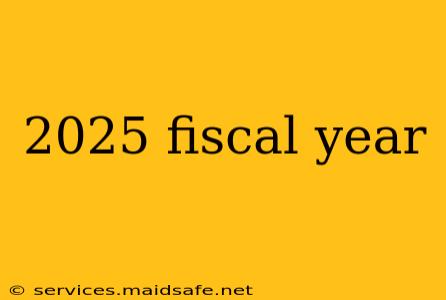Navigating the 2025 Fiscal Year: Key Trends and Strategies
The 2025 fiscal year presents both challenges and opportunities for businesses and individuals alike. Understanding the key trends and developing effective strategies will be crucial for success. This comprehensive guide explores the significant factors shaping the 2025 fiscal landscape and offers actionable insights for navigating this pivotal year.
Macroeconomic Factors Shaping the 2025 Fiscal Year
Several macroeconomic factors will significantly influence the 2025 fiscal year. These include:
-
Inflation and Interest Rates: The ongoing impact of inflation and subsequent interest rate adjustments will continue to affect consumer spending, investment decisions, and overall economic growth. Businesses need to carefully monitor these trends and adjust their pricing and financial strategies accordingly. Careful financial planning and proactive risk management will be paramount.
-
Geopolitical Uncertainty: Global geopolitical events will undoubtedly impact supply chains, trade relations, and market stability. Developing robust contingency plans and diversifying supply sources are crucial for mitigating potential disruptions. Staying informed about global events and adapting quickly to changing circumstances is essential.
-
Technological Advancements: Rapid technological advancements, particularly in areas like artificial intelligence and automation, will continue to reshape industries and create new opportunities. Companies must invest in research and development to stay competitive and adapt to these changes. Embracing new technologies and upskilling the workforce will be key to success.
-
Sustainability and ESG Concerns: Environmental, Social, and Governance (ESG) factors are increasingly influencing investor decisions and consumer behavior. Businesses must prioritize sustainable practices and demonstrate a commitment to social responsibility to attract investment and retain customers. Integrating ESG into core business strategies is no longer optional but a necessity.
Key Strategies for Success in the 2025 Fiscal Year
To thrive in the 2025 fiscal year, businesses and individuals should focus on the following strategies:
-
Financial Planning & Forecasting: Accurate financial planning and forecasting are more important than ever. Businesses need to develop detailed budgets, monitor cash flow closely, and prepare for potential economic downturns. Scenario planning can help businesses prepare for a range of possible outcomes.
-
Supply Chain Resilience: Strengthening supply chain resilience is critical to mitigating risks associated with geopolitical instability and disruptions. Diversifying suppliers, investing in inventory management systems, and building strong relationships with suppliers are crucial. Investing in supply chain technology can help enhance visibility and agility.
-
Innovation and Technology Adoption: Embracing new technologies and fostering a culture of innovation will be essential for maintaining a competitive edge. Businesses should invest in research and development, explore new business models, and upskill their workforce to adapt to technological advancements. Data-driven decision-making will play a crucial role.
-
Talent Acquisition and Retention: Attracting and retaining top talent will be a key challenge in the 2025 fiscal year. Companies need to offer competitive salaries and benefits, create a positive work environment, and invest in employee development. Focusing on employee well-being and creating a strong company culture are crucial.
Conclusion: Preparing for the Future
The 2025 fiscal year presents a complex and dynamic environment. By proactively addressing the macroeconomic factors, adopting appropriate strategies, and focusing on long-term sustainability, businesses and individuals can navigate this period effectively and position themselves for future success. Continuous learning, adaptability, and strategic planning are crucial for navigating the uncertainties ahead. The 2025 fiscal year demands a proactive and strategic approach to secure a prosperous future.

